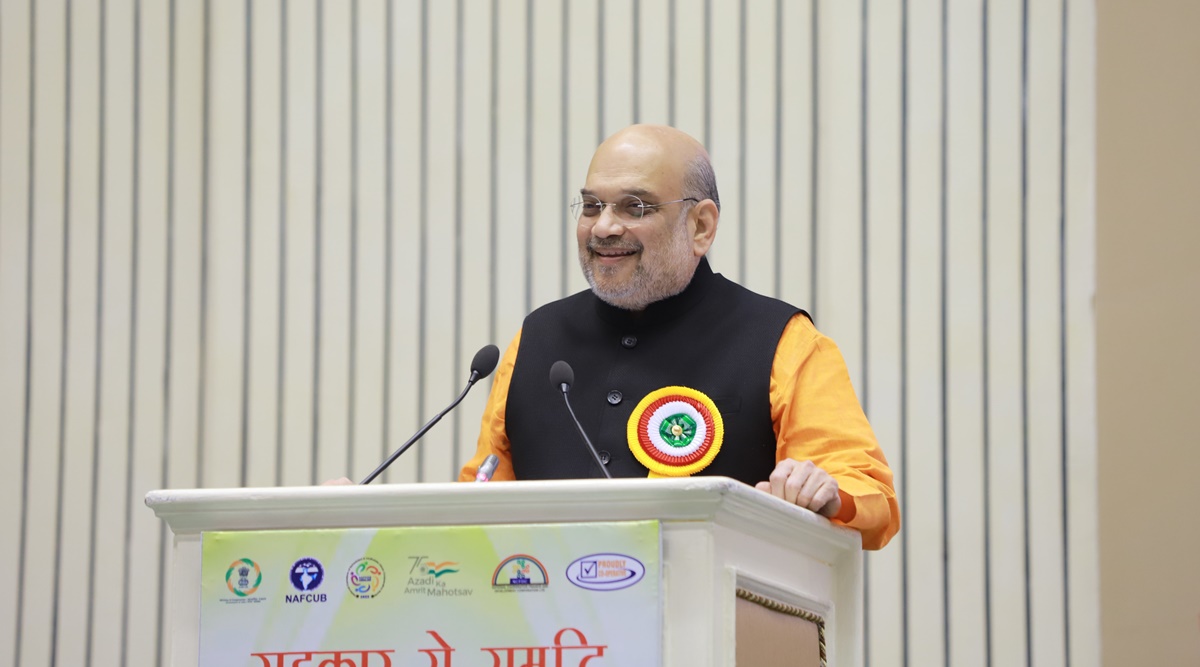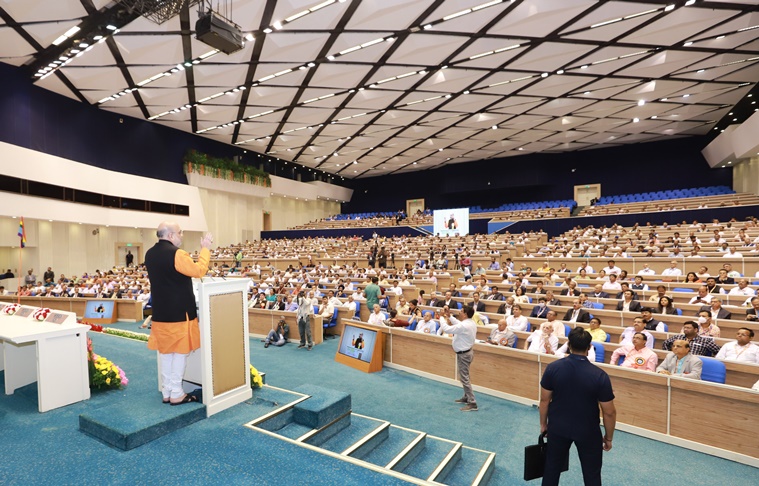 Minister for Home and Cooperation Amit Shah addresses the National Conclave on Scheduled and Multi State Urban Cooperative Banks and Credit Societies on Thursday. (Twitter/@AmitShah)
Minister for Home and Cooperation Amit Shah addresses the National Conclave on Scheduled and Multi State Urban Cooperative Banks and Credit Societies on Thursday. (Twitter/@AmitShah)ASSURING THE cooperative sector that it will no longer be treated like a “second-grade citizen”, Minister for Home and Cooperation Amit Shah on Thursday asked the Urban Cooperative Banks (UCBs) to undertake institutional reforms.
Addressing the National Conclave on Scheduled and Multi State Urban Cooperative Banks and Credit Societies, Shah said UCBs account only 3.25 per cent of the total bank deposits and 2.69 per cent of the total advances in the country.
“We should take a resolve to expand this. I assure you that the Narendra Modi government is in power and you will no longer be treated as a second-grade citizen. You should not worry,” Shah said.
“You will be treated on a par. You will not get any special favour but you will not be treated like a second-grade citizen in respect of be it taxation, BR Act [The Banking Regulation Act, 1949] or the Reserve Bank’s norms…. Urban Cooperative Banks will be treated equally,” said Shah, addressing the conclave organised by the National Federation of Urban Cooperative Banks and Credit Societies (NAFCUB).
Best of Express Premium
Shah, however, said that the responsibility of development lies with the cooperative sector.
“It is our responsibility to establish our trustworthiness and earn people’s faith. It is our responsibility to win the confidence of the RBI and the government through our conduct,” he said.
 Shah asked the UCBs to undertake institutional reforms like transparency in recruitment and implementation of a robust accounting system, which he said are necessary for their growth. (Twitter/@AmitShah)
Shah asked the UCBs to undertake institutional reforms like transparency in recruitment and implementation of a robust accounting system, which he said are necessary for their growth. (Twitter/@AmitShah) Shah asked the UCBs to undertake institutional reforms like transparency in recruitment and implementation of a robust accounting system, which he said are necessary for their growth.
“If we want to expand…. then we will have to undertake some sansthagat parivartan (institutional reforms),” Shah said.
He asked the urban cooperative banks’ representatives to consider whether their boards are “cooperative” in nature. He asked them to bring in new people, young people and professionals in managerial roles, who will take cooperative forward.
“We should compare our human resource with the private sector banks and nationalised banks, with whom we have competition,” he said.
“Is our recruitment process professional? Has our accounting system become fully computerised? Do we have an auto-alert system in our account software as per the norms? There are so many things. I don’t want to say a lot… but we should introspect,” Shah said, adding that the UCBs will have to adopt change to stay in the competition.
“We will have to change with the time… I can assure you on behalf of the Narendra Modi government that no one will dare to commit unjust acts with you…We will have to introspect and adopt new reforms,” Shah said.
He said that the NAFCUB needs to focus more on the Urban Credit Cooperative Societies particularly on their accounting software and their common bylaws.
Discussing the amendments in the BR Act, Shah said, “I have seen the amendments very closely. I too have some differences with the NAFCUB that they should not do this; and the RBI has done the right thing…Ultimately, it will be our loss, if we don’t accept reforms.”
Referring to the RBI’s various restrictions on the cooperative banks, Shah said, “There should be no doubt about the cooperative sector. There is no need to be extra vigilant as well.”
Stating that there are about 1,534 Urban Cooperative Banks, more than 10,000 branches, 54 Schedule Banks, 35 Multi State Cooperative Banks, 580 Multi State Cooperative Credit Societies and 22 State Associations, Shah said the size of the cooperative is huge but its reach is uneven.
“Having a good Urban Cooperative Bank in every town is the need of the hour and country. NAFCUB should not only take up the problems of cooperative banks and solve them but at the same time should also work better for Symmetrical Development,” he said.
“It is the responsibility of all of us to make equal expansion of cooperatives because this can keep us in competition in the coming times. For this, even successful banks will have to come forward.”
Shah said Prime Minister Narendra Modi has described the period of 25 years between 75th and 100th anniversary of India’s Independence as Amrit Kal, which is a period to achieve our goals.
“Our biggest goal is to develop the country; to ensure that our country’s economy is at the top of the world’s economies; and all citizens of the country lead their lives with equal rights,” Shah said.
Minister of State for Cooperation B L Verma said the government has taken various steps for the development of the cooperative sector.
Addressing the conclave, Jyotindra Mehta, president NAFCUB, highlighted various issues related to the urban cooperative banks. He said the amendments in the BR Act provide for a term of four years (maximum two terms) for the directors, while the bylaws have a provision of 5 years. Mehta also highlighted income tax related issues pertaining to the cooperative banks.
Gyanesh Kumar, Secretary, Ministry of Cooperation, and other officials were present on this occasion.
- The Indian Express website has been rated GREEN for its credibility and trustworthiness by Newsguard, a global service that rates news sources for their journalistic standards.

